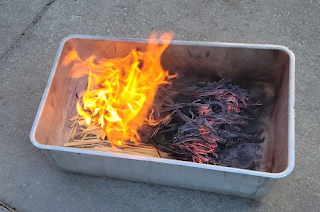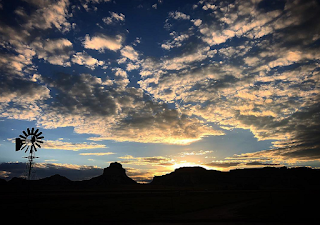Stir Up Sunday
Stir up your power, O Lord, and with great might come among us...(Collect for Advent III)
One of the sermon resources I used this week had this cartoon: The first panel shows someone looking up and shouting to the heavens, ‘God! If you’re up there, tell us what we should do!’ The second panel has a voice coming from the clouds, “Feed the hungry, house the homeless, establish justice.” In the third pane the person has an alarmed expression, “Just testing!” they say. Then the voice answers back, “Me too.”
This Third Sunday of Advent is called Gaudete Sunday—“Rejoice” Sunday. Instead of purple candles and purple vestments—reminders that Advent is sometimes called the “Little Lent”—we light the pink candle and we wear pink rose vestments. The prophet Zephaniah—usually a pretty somber, doom-and-gloom guy—today says, “Sing aloud, O daughter Zion; shout, O Israel! Rejoice and exult with all your heart, O daughter Jerusalem!” Instead of a Psalm we read the First Song of Isaiah, “Therefore you shall draw water with rejoicing from the springs of salvation.” Paul, in his letter to the Philippians, tells us, “Rejoice in the Lord always; again I will say, Rejoice.”
But then…then we get John the Baptist in Luke, crying out in the wilderness: “You brood of vipers!... Even now the ax is lying at the root of the trees; every tree therefore that does not bear good fruit is cut down and thrown into the fire…One who is more powerful than me is coming….His winnowing fork is in his hand, to clear his threshing floor and to gather the wheat into his granary; but the chaff he will burn with unquenchable fire." Somehow, Luke insists, “So, with many other exhortations, John proclaimed the good news to the people.” Axes and pitch forks and unquenchable fire…that doesn’t exactly sound like good news!
Like us, the Jewish people of John the Baptist’s time had not been hearing much that could be considered good news. For several hundred years they had been a conquered and occupied nation, handed off from one military power to another. Rome had ruled them for about 100 years, and Herod the Great, the king of Judea, was effectively a Roman puppet and a bloodthirsty tyrant. As the Jewish Encyclopedia puts it, “"above all, [Herod] was prepared to commit any crime in order to gratify his unbounded ambition." Like Rome, he ruled by fear and oppression. The Jewish high priests were not much better. There had been more than 60 attempts at violent revolution that had come and gone, in many cases brutally squelched. There was an enormous, unsustainable divide between the wealthy and elite and the poor. Something had to change.
Some were looking for a fulfillment of the old prophecies of a time when God would bring restoration, releasing them from their captivity again, destroying their enemies, and renewing God’s ancient covenant. And then John, this camel-skin wearing, grasshopper-eating wild man, shows up in the wilderness proclaiming that the time of salvation has come! No wonder we’re told the crowds came out to hear what he had to say. But, while they were expecting him to say, “Rejoice! Get ready for the battle to defeat these oppressive Romans!” imagine their surprise when, after coming all this way, what they hear instead is, “You brood of vipers!...Don’t think that just because you are children of Abraham you’ll be saved—that doesn’t mean anything! God can turn these stones on the desert floor into children of Abraham!” “Even now the ax is lying at the root of the trees; every tree therefore that does not bear good fruit is cut down and thrown into the fire." Again—doesn’t really sound like good news! It sounds like judgement day.
Those who went to hear John actually took his warnings of judgement and exhortations to repent to heart. "What then should we do?" the crowd asks…"What then should we do?" the Tax Collectors ask…"What then should we do?" the soldiers ask. This is what repentance looks like for Luke—not an abstraction, not simply an internal decision to turn to God—but an ethical vision for our everyday lives, as we live them. You can’t tell it from the NRSV translation we use, but the phrases “bear fruits worthy of repentance,” and “every tree therefore that does not bear good fruit is cut down,” and “what then should we do?” are all using the exact same verb.
What should we do? What fruit should we bear? This is where the good news comes in. Those who were in the Surprised by Hope book study that we just finished will recognize here one of the Biblical truths that Bishop Wright was trying to help us to understand—judgement day is, in fact, good news! John, the prophet in the wilderness, is exhorting everyone to be prepared for the arrival of the Messiah, who, in justice and mercy, will inaugurate the setting to right of all that is out of join in our world. In the words of Mary’s Magnificat, found just before today’s reading in Luke: the proud will be scattered in their conceit, the powerful will be brought down and the lowly lifted up, the hungry filled and the rich sent away empty. Judgement is wonderful good news for the oppressed; it is only bad news for the oppressors!
John speaks directly to the daily temptations inherent to each group that asks the question—He admonishes the crowds to share their resources with those who have none. The tax-collectors: don’t be greedy. The Soldiers: don’t abuse power. The bearing of fruits worthy of repentance is lived out in the everyday practices of life, no matter what that daily life is. The good news is that the Messiah is coming to restore creation and establish God’s kingdom on earth as in heaven, and John says we all have a role in preparing for that kingdom. David Lose, Lutheran pastor and author of Making Sense of Scripture, says the good news of this role John says we are to play is that it “demands neither renunciation nor asceticism, neither pilgrimage nor sacrifice. Rather, participating in God's new kingdom is available to [us] where [we] are, requiring only the modicum of faith necessary to perceive the sacred in the ordinary." That is, John didn’t tell the tax collectors to stop collecting taxes; he didn’t tell the soldiers to stop serving. John isn’t asking us to join him in wearing hair shirts and eating bugs in the desert—John is asking us to do something right where we already are in our daily lives.
The Messiah is coming—to the Jews listening to John, and to us. John’s good news is our good news: the Creator of all, the God of Israel, is faithful and full of loving-kindness. God is renewing the covenant the prophet Isaiah tells of in chapter 42: “I am the Lord, I have called you in righteousness, I have taken you by the hand and kept you; I have given you as a covenant to the people, a light to the nations, to open the eyes that are blind, to bring out the prisoners from the dungeon, from the prison those who sit in darkness.” God is renewing this covenant in the most visible, touchable, embraceable way possible—in God’s son Jesus. God’s people, then and now, are called to repent and reaffirm the covenant. Believe this good news. Prepare yourselves and the world for Jesus’ arrival.
“Stir up your power, O Lord, and with great might come among us…” That’s the opening of the collect for day we heard at the start of worship today. In addition to being called “Gaudete” Sunday, this is “stir up” Sunday for us—the day when in Anglican tradition, you go home and stir up a special English Christmas pudding (dessert). I have for you in the Narthex one of my favorite recipes for this—sticky date toffee pudding. It has, as this tradition calls for, thirteen different ingredients, for Jesus and the twelve apostles. My prayer for this week is that you will make this, or something else, and share it with family and friends as you share with them the joy of our preparation of the Messiah’s birth. May we all be stirred up by John the Baptist’s prophetic words, may we all be stirred up to ask, “What then should we do?” and may we all be stirred up with God’s grace and power to go out into the world, bearing fruits worthy of repentance.




"Why would let the Americans maintain 50 % of the gaming industry in Macau," stated Lee, founder of Macau gaming consultancy IGamiX. Until lately, the renewal of concessions appeared like a done deal for the six 빅카지노 companies permitted to function casinos, which embrace the subsidiaries of three Las Vegas giants — Sands China, MGM China and Wynn Macau. It is an industry reshuffle that will shape Macau's next decade, raising questions over whether town can return to being the world's prime on line casino hub, whether it should seek an alternate path and whether its golden years are over. The disaster comes at a delicate time for Macau's oligopoly of casinos.
ReplyDelete